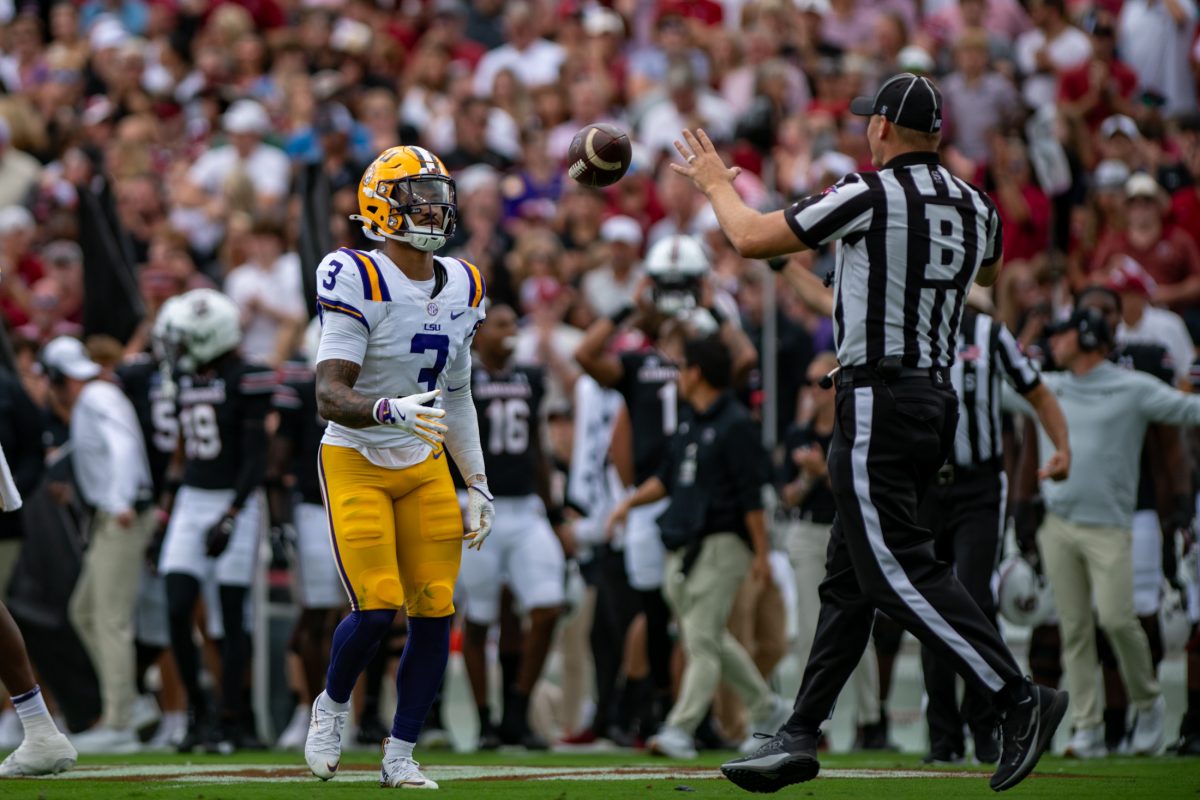There’s a penalty flag on the field.
Head referee Jason Autrey turns to the nearly 80,000 fans that pack Williams-Bryce Stadium in Columbia on Saturday for an SEC matchup between LSU and South Carolina to announce the call.
It’s a delay of game call on the Tigers’ defense. The Sandstorm supporters erupt. LSU head coach Brian Kelly is far from amused; he’s seen this before.
But how is that possible? How can the defense get flagged for a delay of game penalty?
The Tigers’ defense has been called for delay of game penalties twice during the first three games of the 2024 season, one taking place in each USC game.
Kelly was asked about the unordinary penalties during his press conference on Monday.
“Yeah, they were valid,” Kelly said.
But what exactly did Kelly’s defense do to warrant such valid penalties?
In LSU’s matchup against Southern California at Allegiant Stadium in Las Vegas, Trojans quarterback Miller Moss clapped for the snap. The Tigers’ defense clapped back, literally.
“The first one, we clapped to move our front. And you can’t clap when the cadence is a clap. And that was just a mistake made by one of our linebackers,” Kelly said. “He was trying to get somebody’s attention and you just can’t do that.”
In the 2022 National Championship at Lucas Oil Stadium in Indianapolis, Alabama linebacker Henry To’oTo’o was flagged for clapping prior to Georgia’s offense snapping the ball. Head referee Duane Heydt made the call for the whole country to hear: “Disconcerting signals — clapping.”
“Everybody tries to get an advantage,” NCAA coordinator of officials Steve Shaw said in a New York Times article. “But it’s an unfair advantage if the defense tries to do something that’s mirroring the offensive cadence or moving in a way that simulates action at the snap. And many times that’s designed to cause the offense to false start.”
The NCAA and its referees are doing their best to ensure that defenses cannot trick offenses into jumping early.
“All we’re trying to do is take an unfair advantage that someone is trying to gain, take it out of the game,” Shaw also said in the NYT article.
This sudden crackdown on disconcerting signals has been emphasized over the past couple of years.
“If you go back three years, you probably rarely saw a foul for disconcerting signals, delay of game on the defense,” Shaw also said in the article. “But now you see it a lot more because our officials are so dialed in and trying to pick that up when that happens. It’s a hard call. I wish it was easy.”
While difficult, the NCAA has ensured their referees are hard on throwing the flag. If an offensive lineman jumps after a defensive clap, it could be all the officials need to make the right call.
“It’s a huge cat-and-mouse game,” Shaw said in the article. “Where we try to come in is if there’s action to create the opponent to foul. Then that’s what we want to get.”
While LSU’s defensive delay of game penalty against Southern California was called due to disconcerting signals, the same can’t be said for Saturday’s SEC contest against South Carolina.
“The other one was one of our defensive ends was moving, and as he moved, he moved his arms. And that is not a natural movement when you’re sliding the front,” Kelly said. “So because he was in a two-point and he moved his arms, they considered that an unnatural movement.”
Kelly went on to ensure Tiger fans that that mistake won’t happen again.
“We’ve coached our guys up on that,” Kelly said. “It has to be a natural movement. You can’t have something unnatural relative to the movement of your front. So we agree with the decision in that, and we’ve really coached our guys hard on that movement has to be synchronized. It has to be natural. It can’t be an unnatural movement.”
While Kelly did an excellent job of explaining what the referees saw to make the call on Saturday, it doesn’t make the rule any less confusing.
In the NFL, the defense’s ability to significantly shift before the snap gives them an advantage in an already offensively-orriented league. If anything, college football favors the offense even more than the NFL does, so why should the NCAA take away something that the defense can use to level the playing field?
The closer the NCAA tweaks its rules to the NFL, the more prepared and ready their players will be for the pros.










